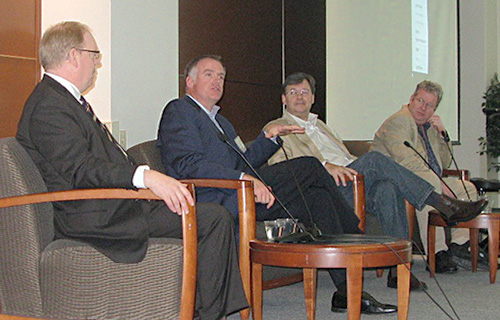Technological advances drive innovation – the lifeblood of growth – by delivering faster, more efficient solutions, four corporate senior executives said during a recent technology forum at UT Dallas’ Naveen Jindal School of Management.
The panel session, “Delivering Value Through Managed Innovation,” was co-hosted March 22 by the Jindal School’s Center for Information Technology and Management (CITM) and Kalypso Consulting.
“The good thing about technology is that the cost is dropping significantly over time. It doesn’t change the world. It makes the world a lot smaller.”
Ron Brown, chief information officer of Global Research and Development at PepsiCo
For example, more companies are replacing face-to-face meetings with virtual meetings to cut time and costs with videoconferencing. The practice has transformed company culture and begun to play a bigger role in how employees collaborate on new ideas for developing products or solving problems, said Ron Brown, chief information officer of Global Research and Development at PepsiCo.
“At PepsiCo, we have high-definition video in most of our large offices worldwide. Is it game-changing? Yes, it’s absolutely game-changing because we can now do an M&A (merger and acquisition), an acquisition or a process without putting anyone on the road,” Brown said. “I’m on video pretty much every day. And so because I don’t have to be on the road, it’s much faster. It’s the way business is going.
“The good thing about technology is that the cost is dropping significantly over time. It doesn’t change the world. It makes the world a lot smaller,” he said.
Videoconferencing at Sony has also become part of company culture, says Trey Bradley, executive vice president at Sony’s Video Supply Chain Services. The company has regularly used videoconferencing capabilities in all of its offices, he said.

From left: Ron Brown of PepsiCo, Trey Bradley of Sony’s Video Supply Chain Services, Daryl Risinger of Concentra and George Young of Kalypso Consulting discuss technology in the business world.
“I’ve got a project team split between international offices and we have a full-time video conference dedicated and set up on each end of those rooms so their workroom is essentially part real and part video on both sides. When people come in, they hear each other talking. It’s the closest thing they can get to a digital water cooler. Culturally, now it’s natural to them,” Bradley said.
With improved technology. Companies are generating greater masses of data that must be managed, known as “big data.” Big data is changing the whole equation for business, said George Young, founding partner of Kalypso Consulting. “But it doesn’t necessarily mean they know what to do with it.
“First of all, they have to store it because if you don’t store it, you lose it. Secondly, you have to be able to mine it and you have to mine it in a certain way to find things that you can’t find today,” Young said. “The key to big data is being able to find out what you already know, to search for what’s already there, put together new insights that aren’t apparent and help you innovate and develop new products.”
Great ideas can come from senior management, sales people or manufacturing employees, Brown said, but the key is to prioritize and focus on ideas or products that will make the biggest impacts.
“There's nothing more frustrating in a large company than having what you know is a great idea get run over by the machinery and somebody else picks it up and does something phenomenal with it.”
Trey Bradley, executive vice president at Sony's Video Supply Chain Services
Bradley cautioned that management should be careful about who is paying attention to what the market wants and make sure those people are watching for innovations that crop up organically in enterprise.
“There’s nothing more frustrating in a large company than having what you know is a great idea get run over by the machinery and somebody else picks it up and does something phenomenal with it,” Bradley said.
Front-line employees have to know they can bring ideas forward and won’t be turned away, said Daryl Risinger, senior vice president of product development at Concentra, a Humana Inc. subsidiary. Risinger pointed to tech firm Intuit as a company that constantly puts new ideas to the test. More than $100 million of the Turbo Tax developer’s 2012 revenue came from products that didn’t exist three years ago, he said, “and that comes from the top.”
Innovation in healthcare involves improving inefficiencies, Risinger said. His team spends time outside the office talking to customers and patients to learn what problems they have with processes or unmet needs.
“We collect those continuously and then bring them into an incubator,” Risinger said. “It’s really about creating a dependable, repeatable, scalable model. It’s understanding that you have to latch on to those ideas or opportunities that are close to the core in terms of what your capabilities are.”
The event was organized by Dr. Kelly Slaughter, who joined the Jindal School last fall as the Center for Information Technology and Management’s new director. The center, chartered to engage with industry to advance knowledge of digital technologies and the information services ecosystem, will continue exploring innovation issues through joint projects with the forum co-sponsor Kalypso.